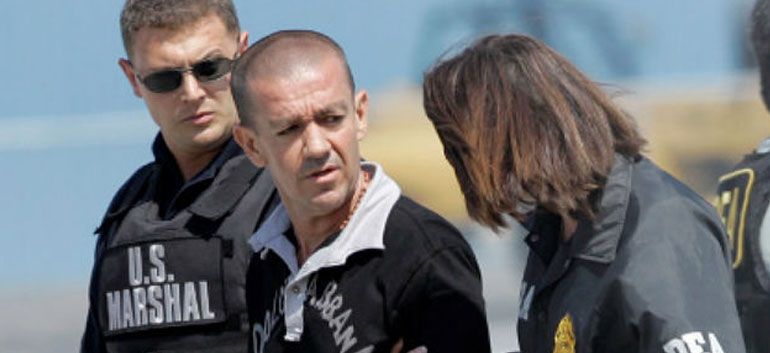Colombia has asked the United States to send back a famous drug lord recently released from US prison, according to a statement released by the Ministry of Justice.
Juan Carlos Sierra, alias “El Tuso,” bribed his way into the demobilization process extended to Colombia’s largest paramilitary group at the time, the AUC, and was extradited to the United States in 2008 under false pretenses.
Earlier this year, El Tuso was released from US prison, after a reduced five-year sentence he received in exchange for cooperation with authorities. Last week it was announced that he and his family would be receiving US work residency permits, against the protests of various current and ex-officials in the Colombian government calling for his return to Colombia.
MORE: Former drug lord avoids deportation back to Colombia
Semana magazine reports that El Tuso would face 12 different charges if he were to be deported back to Colombia.
MORE: Ex-drug lord El Tuso released from prison
Vice-Minister of Justice Miguel Samper was quoted as saying, “It is unexplainable that ‘pureblood’ drug traffickers like ‘El Tuso’ Sierra could leave the Ralito negotiations in 2004 only to enter the 2006 paramilitary negotiations through the back door. Even more unexplainable is the fact that [the Colombian government] extradited paramilitary chiefs, with them, truth and justice.”
Justice and peace?
In 2005, the government of then-President Alvaro Uribe agreed to the Peace and Justice legal framework, which offered fixed reduced sentencing to members of Colombia’s AUC paramilitary umbrella group in exchange for their demobilization and full cooperation and testimony.
From the beginning, however, the demobilization process was fraught with irregularities, not the least of which involved widespread claims that drug dealers such as El Tuso were defrauding the law as a means to access the legal impunity it provided. It was later alleged that the entire “Heroes de Granada” bloc with which El Tuso demobilized was in fact a front.
Extradition to the US complicated these complaints, as many prominent AUC leaders were sent abroad and never made to testify in front of Colombian courts. Their crimes, say critics, have vanished with them, and now that some are seeking permanent residence in the states, the prospect that Colombia will receive little of the promised reconciliation from the lenient terms of surrender extended to the paramilitaries is once again presented.
El Tuso’s case
El Tuso’s extradition was more controversial than most, as it was authorized by the Uribe government without the necessary consent of the Supreme Court.
In a tweet last week, Miguel Samper commented on El Tuso’s release from prison: “With this worrisome case, impunity is settled and the extradition of the bosses of the AUC was feigned.”
FACT SHEET: Parapolitics
In testimony given to US authorities, El Tuso implicated over 60 Colombian government officials, including former President Uribe himself, in so-called “parapolitics” — criminal collusion with paramilitary groups. But El Tuso has never testified in Colombian court nor collaborated with Colombian investigators, and officials now believe the former drug lord has been concealing information regarding corruption within the Colombian government and connections between politicians, businessmen, the armed forces, and the AUC.
MORE: ‘El Tuso’ incriminates 60 officials in ‘parapolitics’ scandal
Extradition
El Tuso’s case is a prime example of the arguments many have made against the status quo of Colombian-US extradition policy. Vice-Minister Samper recently said, “What’s needed is to negotiate a new extradition policy with the United States.”
Critics say extradition, ostensibly intended to circumvent corruption in the Colombian justice system, has actually crippled the legitimacy of Colombian law and law enforcement and provided the equivalent of impunity to many of Colombia’s worst criminal offenders.
There is no word yet as to whether the United States will honor Colombia’s extradition request in El Tuso’s case. But Samper has been quoted as saying, “The government has the ability to condition extradition to comply and satisfy requirements; one of those should be reciprocity, and the United States has to accept.”


